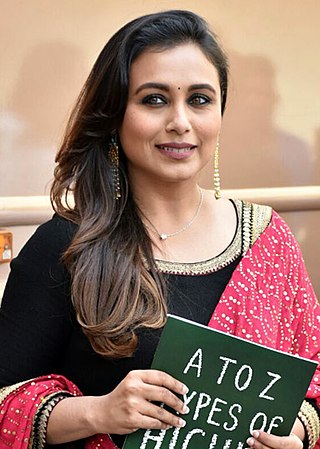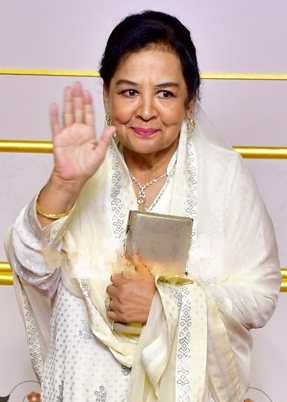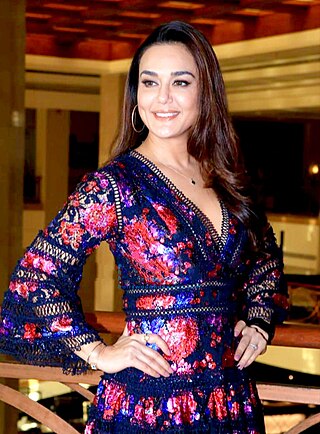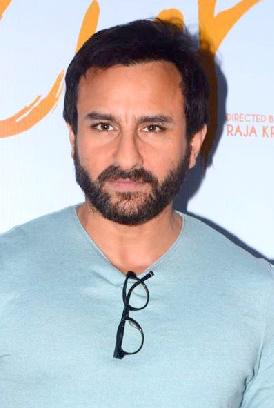
Rani Mukerji is an Indian actress who works in Hindi films. Noted for her versatility, she is the recipient of multiple accolades, including eight Filmfare Awards. Mukerji has featured in listings of the leading and highest-paid actresses of the 2000s.

Preity G Zinta is an Indian actress and entrepreneur primarily known for her work in Hindi films. After graduating with degrees in English honours and criminal psychology, Zinta made her acting debut in Dil Se.. in 1998, followed by a role in Soldier in the same year. These performances earned her the Filmfare Award for Best Female Debut, and she was later recognised for her role as a teenage single mother in Kya Kehna (2000). She established a career as a leading Hindi film actress of the decade with a variety of character types. Her roles, often deemed culturally defiant, along with her unconventional screen persona won her recognition and several accolades.

Kareena Kapoor Khan is an Indian actress. A prolific leading lady of Hindi cinema since 2000, she is noted for her roles in a range of film genres—from romantic comedies to crime dramas. Kapoor is the recipient of several awards, including six Filmfare Awards, and as of 2024, is one of Hindi cinema's highest-paid actresses.

Karisma Kapoor is an Indian actress who primarily works in Hindi films. One of the leading and highest-paid actresses of her time, Kapoor is the recipient of several accolades, including a National Film Award and four Filmfare Awards.

Sonali Bendre is an Indian actress who predominantly works in Hindi, Tamil and Telugu films. Bendre did modelling assignments prior to making her acting debut with Aag (1994), which won her the Filmfare Award for New Face of the Year.

Shammi Kapoor (born Shamsher Raj Kapoor; was an Indian actor known for his work in Hindi cinema. Kapoor is considered as one of the greatest and most successful actors in the history of Indian cinema. In a career spanning over five decades, Kapoor worked in over 100 films. He is the recipient of three Filmfare Awards, including one for Best Actor.

Sushmita Sen is an Indian actress and beauty pageant titleholder, who was crowned Miss Universe 1994, becoming the first Indian woman to win the title. Sen has since predominantly worked in Hindi films, and is a recipient of a Filmfare Award and a Filmfare OTT Award.

Tabassum Fatima Hashmi, known professionally as Tabu, is an Indian actress who works primarily in Hindi films. Regarded as one of Hindi cinema's most accomplished actresses, she also appeared in Tamil, Malayalam, Telugu, English and Bengali films, she has often played troubled women, from fictional to literary, in both mainstream and independent cinema. She is the recipient of numerous accolades, including two National Film Awards, seven Filmfare Awards, and two Filmfare Awards South. In 2011, she was awarded the Padma Shri, the fourth highest Indian civilian honour.

Juhi Chawla Mehta is an Indian actress. She established herself as one of the leading actresses of Hindi cinema from the late 1980s through the early 2000s. Recognised for her comic timing and vivacious on-screen persona, she is the recipient of several accolades, including two Filmfare Awards.

Jaya Bachchan is an Indian actress and politician. She is serving as member of the parliament in the Rajya Sabha from the Samajwadi Party since 2004. Having worked in Hindi films and Bengali films, she is noted for reinforcing a natural style of acting in both mainstream and arthouse cinema. A recipient of several accolades, she has won Filmfare Awards and the Padma Shri, the fourth-highest civilian honour awarded by the Government of India.

Mumtaz Askari Madhvani, known mononymously as Mumtaz is an Indian actress who worked in Hindi films. Regarded as one of the finest actresses of Hindi cinema, Mumtaz is the recipient of two Filmfare Awards. Mumtaz made her acting debut at age 11 with Lajwanti (1958), Sone Ki Chidiya (1958), and did smaller roles in films like Stree (1961) and Sehra (1963).

Soha Ali Khan Pataudi is an Indian actress who has worked in Hindi, Bengali, and English films. She is the younger daughter of veteran actress Sharmila Tagore and former India cricket captain Mansoor Ali Khan, of Bhopal, and the younger sister of actor Saif Ali Khan. She started her acting career with the romantic comedy film Dil Maange More (2004), and is best known for her role in the drama film Rang De Basanti (2006). In 2017, she authored a book The Perils of Being Moderately Famous that won the Crossword Book Award in 2018.

Amrita Singh is an Indian actress who mainly works in Hindi films. Singh made her acting debut with Betaab (1983), and established herself as a leading actress of the 1980s and early 1990s.

Aradhana is a 1969 Indian Hindi musical romantic drama film directed by Shakti Samanta, starring Sharmila Tagore and Rajesh Khanna. It won the Filmfare Award for Best Film at the 17th Filmfare Awards. Tagore won her only Filmfare Best Actress Award. Originally released in Hindi and dubbed in Bengali, Aradhana's huge success led to two remakes: the Tamil film Sivagamiyin Selvan (1974) and the Telugu film Kannavari Kalalu (1974). This film is counted among the 17 consecutive hit films of Rajesh Khanna between 1969 and 1971, by adding the two hero films Marayada and Andaz to the 15 consecutive solo hits he gave from 1969 to 1971. Aradhana was a blockbuster in India and the Soviet Union. The theme of the movie was based on the 1946 film To Each His Own. Its run time is 169 minutes.

Farida Jalal is an Indian actress who primarily worked in Hindi films. In a film career spanning almost fifty years, Jalal appeared in over 200 films. Best known for her character-driven roles in independent cinema and supporting work in mainstream Bollywood productions, Jalal has received such accolades as four Filmfare Awards and two Bengal Film Journalists Association Awards.

Mausam (transl. Season) is a 1975 Indian Hindi-language musical romance film starring Sanjeev Kumar and Sharmila Tagore, and directed by Gulzar. It is loosely based on the 1961 novel, The Judas Tree, by A.J. Cronin. Sharmila Tagore for her acting received The Silver Lotus Award at the 23rd National Film Festival and the film itself was awarded the Second Best Feature Film. The film was nominated in eight categories at the 24th Filmfare Awards and won in two. The film also won many other accolades as well.

Safar is a 1970 Indian Hindi romantic drama film produced by the Mushir-Riaz duo and directed by Asit Sen, based on a novel by Bengali writer Ashutosh Mukherjee. The film stars Ashok Kumar, Rajesh Khanna, Sharmila Tagore and Feroz Khan in lead roles. The film became the tenth top-grossing production of the year. It won one Filmfare Awards and four Bengal Film Journalists' Association Awards. Rajesh Khanna received a nomination for BFJA Awards for Best Actor (Hindi). Asit Sen remade the 1956 Bengali film Chalachal, which was directed by him, in Hindi as Safar (1970). As per review by critics, Safar was carried more than ably by Khanna's immense charm at the peak of his popularity. Rajesh Khanna beautifully conveys his character's desperation and his conviction that surviving by a slender thread is not really living. This film is counted among the 17 consecutive hit films of Rajesh Khanna between 1969 and 1971, by adding the two-hero films Maryada and Andaz to the 15 consecutive solo hits he gave from 1969 to 1971.

Preity G Zinta is an Indian actress known for her work in Hindi films. She made her debut in 1998 with a supporting role in the drama Dil Se... Later that year, she starred in the commercially successful thriller Soldier. For the films, she won a Filmfare Award in the Best Female Debut category. In 1999, Zinta played the role of a CBI officer in the psychological thriller Sangharsh. She followed this with the role of a teenage single mother in the Kundan Shah-directed drama Kya Kehna (2000), a sleeper hit. That same year, she starred in the romance Har Dil Jo Pyar Karega, and the crime drama Mission Kashmir, the third highest grossing Bollywood film of the year.

Sara Ali Khan Pataudi is an Indian actress who works in Hindi films. Born into the Pataudi family, she is the daughter of actors Amrita Singh and Saif Ali Khan. After graduating with a degree in history and political science from Columbia University, Khan began her acting career in 2018 with the romantic drama Kedarnath and the action comedy Simmba. Both films were commercially successful, and the former earned her the Filmfare Award for Best Female Debut.

The Pataudi family is an Indian royal (Nawab) family belonging to the former princely state of Pataudi. Later this family got involved in show business and primarily working in India's Hindi film industry, commonly known as 'Bollywood'.


























